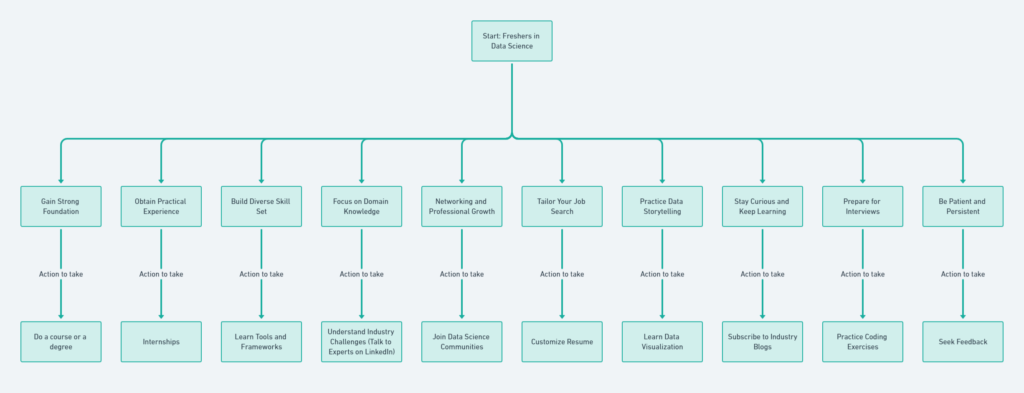Breaking into the data science realm can be a thrilling journey. The importance and growing demand for data science across various industries, fueled by our increasingly data-driven world, has positioned it as a highly desirable career path.
This article aims to be a comprehensive guide for freshers entering the data science field, offering insights and advice to help you navigate your career path effectively.
Table of Contents
Understanding the Data Science Field
Let’s start at the very beginning: What is data science? At its core, data science is the intersection of statistics, data analysis, machine learning, and their related methods, with an aim to understand and analyze actual phenomena through data.
It employs techniques and theories drawn from many fields within the context of mathematics, statistics, computer science, domain knowledge, and information science.
There are several core components that a data scientist needs to master:
- SQL: Used for managing and organizing data.
- Python and R: Two of the most common coding languages used in data science.
- Machine Learning: This involves creating algorithms that allow computers to learn from data.
- Statistics: The bedrock of any data-related job, a strong foundation in statistics will give you the skills to extract insights from data.
- Data Visualization: Translating complex datasets into a format that is easily understandable.
Data science can be distinguished from other related fields, such as data analytics and business intelligence, through its focus on machine learning and predictive analytics. In essence, while all these roles work with data, a data scientist’s role is to design and implement models that further our understanding of that data or predict future trends.
Building a Strong Foundation
If you’re aiming for a data science career, a relevant degree in computer science, mathematics, or statistics can offer a robust base. A strong GPA and an advanced degree can help too but remember, there’s no substitute for real-world experience.
Internships and practical experiences are invaluable in building your skillset. When employers are looking at freshers, they are interested in transferable skills that can be used from day one. Developing proficiency in the aforementioned technical tools – SQL, Python, R – is key. Participating in relevant projects or competitions is another excellent way to demonstrate these skills.
Showcasing Skills and Experience
Your resume is your first impression on a potential employer. Craft a targeted, well-formatted resume that highlights your relevant projects, internships, and research work. Make sure it represents you accurately and professionally, reflecting both your skills and your potential.
Platforms like Kaggle offer the chance to participate in data-centric competitions, an opportunity to showcase your data visualization and storytelling skills. Taking part in such challenges not only gives you practical experience but also adds a unique facet to your portfolio that sets you apart from the competition.
More on building your portfolio, networking, and job search strategies in the next section. Stay tuned!
Networking and Professional Development
Networking plays a crucial role in professional development. Joining data science communities, attending industry events, participating in online forums, and subscribing to industry-specific newsletters can provide exposure to different aspects of data science that you might not encounter in your everyday work.
This way, you can learn from others’ experiences, gain insights into the industry’s current trends, and even find mentors who can guide you on your career path.
Remember, your professional network isn’t just about the number of people you know. It’s about building meaningful relationships that can provide mutual benefit. Participating actively in the data science community can also help you to stay updated with the latest trends, tools, and techniques in data science.
Continuous learning is another crucial aspect of professional development. The data science field is evolving rapidly, so it’s essential to stay updated with new trends and technologies. Online courses, workshops, and certifications from credible sources can help to enhance your knowledge and skills. Take advantage of online platforms like us. We offer courses in data science. You can check our courses here.
Job Search Strategies : Career in Data Science
Navigating the job market requires understanding its dynamics and the specific demands of industries or regions you’re interested in. When you’re starting out, it can be beneficial to apply for entry-level or junior positions to gain valuable experience.
Customizing your applications to match job descriptions and showcasing your relevant skills can increase your chances of being noticed. While job hunting, remember that it’s crucial to be patient and persistent.
It might take time to land the perfect job, but with tenacity and determination, you’ll find the right opportunity.
When tailoring your resume and cover letter, it’s essential to clearly highlight your skills, experience, and the value you can bring to a company. Be sure to align your personal career goals with the company’s objectives.
Professional networking platforms, like LinkedIn, are invaluable tools in your job search process. These platforms can help you connect with recruiters, learn about job openings, and understand what employers are looking for in a candidate.

Overcoming Challenges and Standing Out
When it comes to standing out in the competitive field of data science, there are certain challenges you might face. One such challenge could be biases based on college rankings or the background of your institution.
However, rather than focusing on elements out of your control, concentrate on building a strong track record of accomplishments and skills. Showcasing your expertise through practical applications of data science, such as personal projects or competitions, can demonstrate your capabilities.
Data storytelling and visualization are powerful tools in the data scientist’s toolkit. These skills not only make you stand out but also enable you to communicate complex data insights in a compelling and easy-to-understand manner. By leveraging these skills, you can add value to businesses by providing actionable insights.
Keep reading as we delve into more actionable strategies for freshers entering the data science field in the last section of our guide.
To summarize the importance of skills

Let me give you an action plan

Course of Action for Freshers Entering Data Science
Now that we’ve covered the general landscape of a data science career, let’s dive into the concrete steps you can take to start your journey in this exciting field.
1. Gain a Strong Foundation
Pursue a relevant degree in computer science, mathematics, statistics, or a related field. This will provide you with a solid foundational knowledge of the discipline. Alongside this, master foundational programming skills like SQL, Python, and R, and develop a robust understanding of statistics and mathematics.
2. Obtain Practical Experience
Seek internships or entry-level positions to gain hands-on experience in the field. Participate in data-centric competitions like Kaggle to showcase your skills. Additionally, work on personal projects to demonstrate your expertise and problem-solving abilities.
3. Build a Diverse Skill Set
To succeed in data science, you’ll need to familiarize yourself with popular tools and frameworks. Learn data visualization techniques using tools like Tableau or Power BI, gain knowledge in machine learning algorithms, and develop proficiency in data cleaning, transformation, and integration.
4. Focus on Domain Knowledge
To be truly effective as a data scientist, it’s essential to understand the industry or domain you are interested in, such as healthcare, finance, or marketing. Learn about the specific challenges and opportunities within your chosen domain, and stay updated with the latest trends, regulations, and advancements.
5. Networking and Professional Growth
Engage with the data science community through online forums, meetups, and conferences. Build connections with professionals in the field and seek mentorship. Continuously learn through online courses, tutorials, and workshops, and pursue relevant certifications to enhance your credibility.
6. Tailor Your Job Search
Research and identify companies or industries aligned with your career goals. Customize your resume and cover letter to highlight relevant skills and experiences. Leverage professional networking platforms like LinkedIn to connect with recruiters and industry professionals.
Be open to starting in entry-level positions to gain practical experience and grow within the field.Career in Data Science for Freshers
7. Practice Data Storytelling
Develop the ability to transform complex data into actionable insights. Enhance your data visualization and presentation skills. Learn to communicate effectively with stakeholders and explain technical concepts in a non-technical manner.
8. Stay Curious and Keep Learning
The field of data science is rapidly evolving. To stay ahead, you should constantly update yourself with the latest tools and techniques. Subscribe to industry blogs, journals, or newsletters. Take advantage of online platforms like us.
9. Prepare for Interviews
Before the interview, brush up on fundamental data science concepts and algorithms. Practice coding exercises and problem-solving questions. During the interview, be prepared to showcase your project work and articulate your approach and findings.
10. Be Patient and Persistent
Landing your dream job in data science may take time, so stay motivated and persistent in your job search. Keep refining your skills, learning from rejections, and seeking feedback to improve.

Conclusion
Starting a career in data science requires continuous learning, adaptability, and a passion for solving complex problems. As a fresher, your journey might seem daunting, but with the right guidance and persistent effort, you can carve out a successful career in this thriving field. Remember, the field of data science offers enormous potential and growth opportunities.
We, at Statssy, encourage you to pursue your passion in data science and assure you that the investment in your education and skills development will pay off in the long run. Stay curious, keep learning, and embark on your exciting journey into the world of data science!
Further Quests: Level Up Your Data Game
Ready to take your data game to the next level? Here’s a treasure trove of resources that are as binge-worthy as the latest Netflix series.
Books & Articles
Statistics Fundamentals
- Forecast Like a Pro with Exponential Smoothing in Excel
- Mean vs Median: The Ultimate Showdown
- Simple Linear Regression and Residuals: A Step-by-Step Guide
- Essential Data Terminology for Business Analytics
- Different Types of Statistical Analysis Techniques
- Understanding Residuals in Statistics
- Empirical Rule Calculator in Statistics
- How to Find the Probability of A or B with Examples
- Understanding Skewed Distributions
- Levels of Measurement in Statistics
- Understanding Z-Score in Business Statistics
- What is Spearman’s Rank Correlation Coefficient
- How to Calculate Pearson Correlation Coefficient by Hand
R Programming
- Simple Linear Regression in R: A Super Chill Guide
- Mastering the Use of Letters in R Programming
- How to Calculate Coefficient of Variation in R Language
- How to Create and Interpret Descriptive Statistics in R
- How to Create and Interpret the Boxplot in R
- How to Create and Interpret Histogram in R Studio
Python Programming
- Your First Project in Data Analysis Using Python
- How to Create Boxplot in Python
- How to Create and Interpret Histogram in Python
- How to Calculate Coefficient of Variation in Python
- How to Use ‘With’ Keyword to Open Text File in Python
- Python XOR: Comprehensive Guide to Exclusive OR Operator
So, are you ready to embark on your next data quest?





